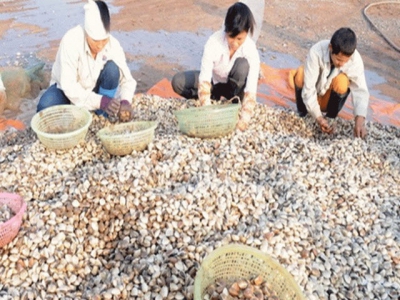Vietnamese bivalve mollusc exports dropped 10% in 2018

Sales for Vietnamese bivalve mollusc in the fourth quarter of 2018 were 22.5 million USD, up 8.4% year on year with EU being the biggest market that represented 62% of total exports and followed by the US, Japan, and China representing 24%.
Total Vietnamese bivalve mollusc in 2018 was nearly 89 million USD, down 10% compared to 2017 with 20% drop being recorded in the EU. Although sales in the US, Japan, and China grew, it could not prevent negative growth in the year.
Clam represents 90% of Vietnamese bivalve mollusc. The leading markets of Vietnam’s processed clam are the EU, the US and Japan. A small number of fresh/frozen clam was exported to Singapore though the airway.
Vietnam exported its bivalve mollusc to 53 markets in 2018 while it was 64 markets in 2017. The top five buyers included the EU, the US, Japan, China and ASEAN that accounted for 92% of export value.
Exports of bivalve molluscto the EU saw a drop of 37% in Q3 2018 with value reaching 12.3 million USD; however, it increased 6.3% in Q4 with two main importers being Italia and Spain. Meanwhile, exports to Portugal continued falling to 23%.
Main products imported by Spain and Portugal include white and brown clam or frozen boiled clam meat at 1.4 – 2 USD/kg. Besides, undulated surf clams are exported to Italia at 3.5 – 4 USD/kg by firms in Thanh Hóa, Tiền Giang, and Bến Tre.
Sales have been falling in three straight months of the year, thus 56 million USD export value to the EU in 2018 reduced 20% year on year despite some recovery in Q4. Exports to Portugal, Spain, and Italia decreased 18%, 19% and 26%, respectively.
In spite of high demand in clams, exports of Vietnamese clamsare questionable in the future as supplying and quality are unstable.
Related news
 Cà Mau to expand sustainable shrimp farming models
Cà Mau to expand sustainable shrimp farming models The southernmost province of Cà Mau, the country’s largest shrimp producer, plans to expand many of its sustainable farming models to fully exploit its potentia
 Benefits of aquaculture are being “overlooked”
Benefits of aquaculture are being “overlooked” Scientists may be overlooking some of the broader ecosystem and social benefits associated with marine aquaculture.
 Cà Mau builds certified shrimp farming area
Cà Mau builds certified shrimp farming area Cà Mau province is planning to build a certified shrimp farming area to supply organic materials for export.